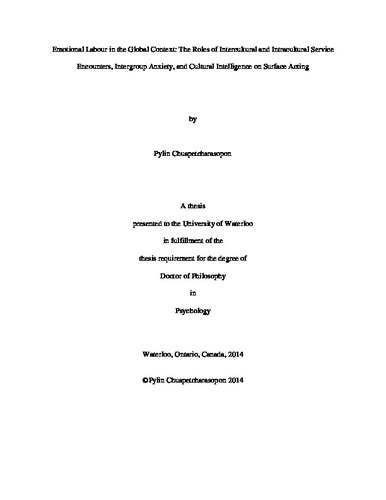| dc.description.abstract | Research on emotional labour has shown that surface acting is the main correlate of employee ill-being such as emotional exhaustion, but culture moderates this relationship, highlighting the importance of considering the cultural context in understanding the surface acting-negative outcome link. However, these findings have emerged from intracultural service encounters, whereby the service provider and customer are from the same cultural backgrounds. Yet, with the growth of immigration and international travel, service providers are increasingly interacting with customers from different cultural backgrounds in intercultural service encounters. These encounters provide unique contexts in which service employees are expected to regulate their emotions, because there is more room for miscommunication and discomfort between service providers and customers from different cultural backgrounds. This dissertation investigates the intrapersonal processes of surface acting in the intercultural service context. Based on self-regulation theory, Study 1 investigated how the intercultural versus intracultural context in which emotional labour is performed influences the experience of surface acting at within-person level of analysis. Results showed that the service context moderated the relationship between daily (within-person) surface acting and emotional exhaustion, such that the relationship was stronger in the intercultural than the intracultural service encounters. Study 2 aimed to replicate findings from Study 1 at the between-person level of analysis in addition to examining the antecedents of surface acting in the intercultural service context at the between-person level of analysis. No significant interaction effect between the service context (intercultural and intracultural) and surface acting on emotional exhaustion was found at the between-person level, and alternative explanations for the null finding are discussed. Drawing from the Anxiety/Uncertainty Management (AUM) theory, results showed that service providers who experienced intergroup anxiety reported more use of surface acting in intercultural service encounters. Moreover, certain facets of cultural intelligence (CQ) were found to have indirect and direct effects on surface acting in intercultural service encounters. Metacognitive CQ was found to have an indirect effect on surface acting through intergroup anxiety; service providers with high metacognitive CQ reported less anxiety with foreign customers and, in turn, reported less surface acting. On the contrary, behavioural CQ was related to increased surface acting. Thus, behavioural CQ appears to be a double-edge sword in intercultural service encounters. By investigating how both the intercultural context and service providers’ intercultural competencies affect their surface acting at work, the two studies highlight the unique considerations of emotional labour in the globalized context. | en |

